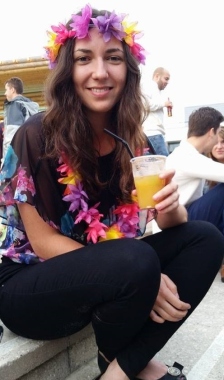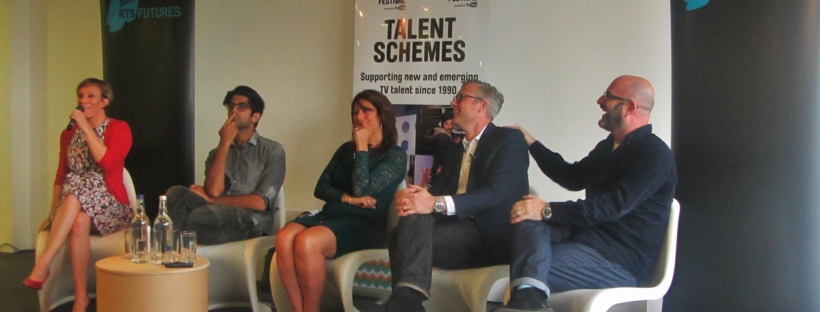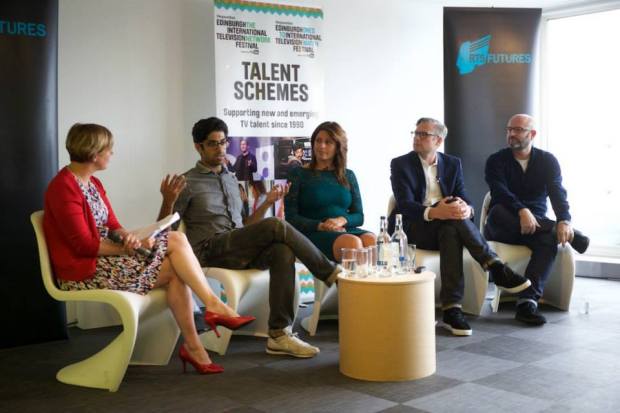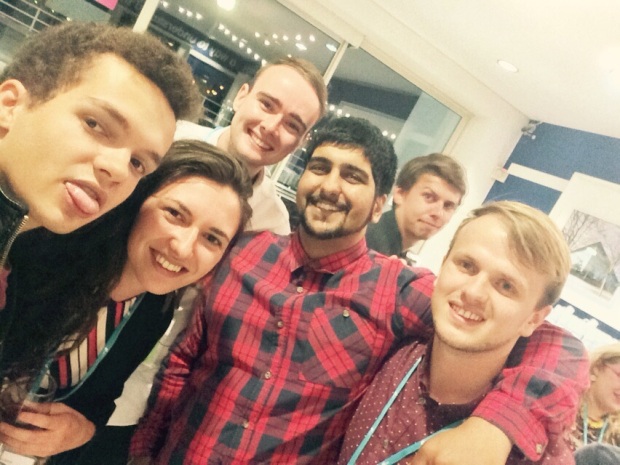BBC Broadcasting House in Oxford Circus hosted a free public event called “Behind the (social) scenes at BBC’s The Voice UK” on the 18th November, in association with the Royal Television Society. The Voice UK, a nationwide search for musical talent, is one of BBC One’s biggest Saturday night entertainment shows, with digital content at the very heart of its format. Engaging viewers online, as we were to discover, is about more than sending out a few tweets and status updates. It relies upon a full-scale marketing strategy, using numerous online platforms before, during and after every live episode.
4 key members of the show’s digital team formed the panel, sharing their secrets to success across Facebook, Twitter, Apps and other forms of second screen engagement. Muki Kulhan, the Executive Digital Producer for the show, chaired the discussion, announcing that the 5th series of the show, due to be aired in January 2016, will see 2 new judges, Paloma Faith and Boy George, join the show alongside current judges Will.i.am and Ricky Wilson.
Muki mentioned the introduction of The Voice Home Coach app, an immersive second screen experience which she described as similar to “fantasy football” (a reality-based, role-playing game) but for music. By using the app on their phone while the show is broadcast on Saturday nights, the viewers are able to “become” a coach, and decide who they would choose to proceed to the next round of the competition, comparing their results with the rest of the country. She also announced that, for the latest series, they would be introducing “The Virtual Voice”, a virtual reality feature that would go live in the UK on platforms including Facebook, YouTube and The Voice UK app, as they continue to invest in online content alongside the main programme.
What is unique to The Voice is that it has a “format with digital at its heart” says Sarah Clay, BBC Commissioning Editor for iPlayer & Entertainment. Sarah has worked on the show since it began 4 years ago and believes that, unlike other shows which may develop their online content for the sake of it, The Voice always saw digital add-ons, from social media accounts to apps and downloads, as integral to the success of the brand. She spoke about the challenges getting the heads of the BBC to agree to an app being developed specifically for the show. But, with 980,000 app downloads in Series 4 alone, it has proved to be a risk worth taking. On top of this, 42% of the BBC’s YouTube traffic was driven by The Voice, which led the digital team to set up their own channel dedicated to the show, featuring exclusive performances, interviews, unseen footage and backstage challenges with the judges.
Below: Muki shows the audience the outcomes of their online marketing strategy for Series 4 of the show, which racked up 87.5 million YouTube views and 2.6 million Facebook likes, comments and shares.

David Levin, Founder of Thatlot, a social creative agency, is also a Chief Tweeter for prime-time shows including The Voice, The Apprentice and Strictly Come Dancing. From his time as a content creator, he has noticed a significant increase in video-driven content, particularly on Facebook and Twitter. For David, the emphasis is on “second screen fun”. By setting the viewers fun challenges, for example to tweet photos of themselves watching the show using the relevant hashtags, and subsequently re-tweeting the best responses, it makes the viewers feel part of the show. Using personable, witty tweets – and coming across as a real person rather than tweeting as a “programme” – is, in his opinion, the way to make the tweets as engaging and shareable as possible. A Twitter pun-off he orchestrated with other BBC Twitter accounts even made the news! And, of course, the highly opinionated columnist and TV personality Katie Hopkins had her say on the show, and joined in by using the hashtag #TheVoice.
Below: David Levin spoke about engaging the audience with interesting tweets that open up the discussion to the rest of the nation, including high profile Tweeters such as Katie Hopkins.

But how does a show start from scratch and manage to build up a loyal following online? Glenn Miller, Head of Entertainment Partnerships at EMEA – Facebook, believes that “you can’t do it on your own – you rely on your network to suceed”. In the case of The Voice, the show was able to capitalise on its talent, from the presenters and judges to contestants, in order to create additional content for the show that the users could relate to and share. For example, each judge’s role not only involved selecting and mentoring aspiring musicians, but also contributing to video content for iPlayer and YouTube, taking part in lip syncing contests among other activities which allowed viewers to see the judges in a different light to the main show.
As the panel opened up questions to the audience, talk turned to the inevitable question of the future of the BBC’s involvement in the show after it was revealed that it would be moved to ITV following the next series. The general consensus was that the BBC team would remain focused on the present situation, and would continue to work hard to ensure that the last series of the show to be broadcast on the BBC will be the best one yet. In the meantime, they hope to grow their online presence by 20% and will focus particular attention on expanding the reach of its iPlayer services.

Above: The Voice UK’s digital strategy incorporates multiple platforms which cater to different audiences. According to Sarah Clay, Twitter and YouTube are slightly more skewed to a male audience whereas Facebook is skewed more towards an older, female demographic.
If you’d like to find out more about the show or to join in the conversation tweet @BBCTheVoiceUK or you can use the hashtag #TheVoiceUK.
For more information about upcoming TV talks and events, head to BBC Academy or the Royal Television Society.





